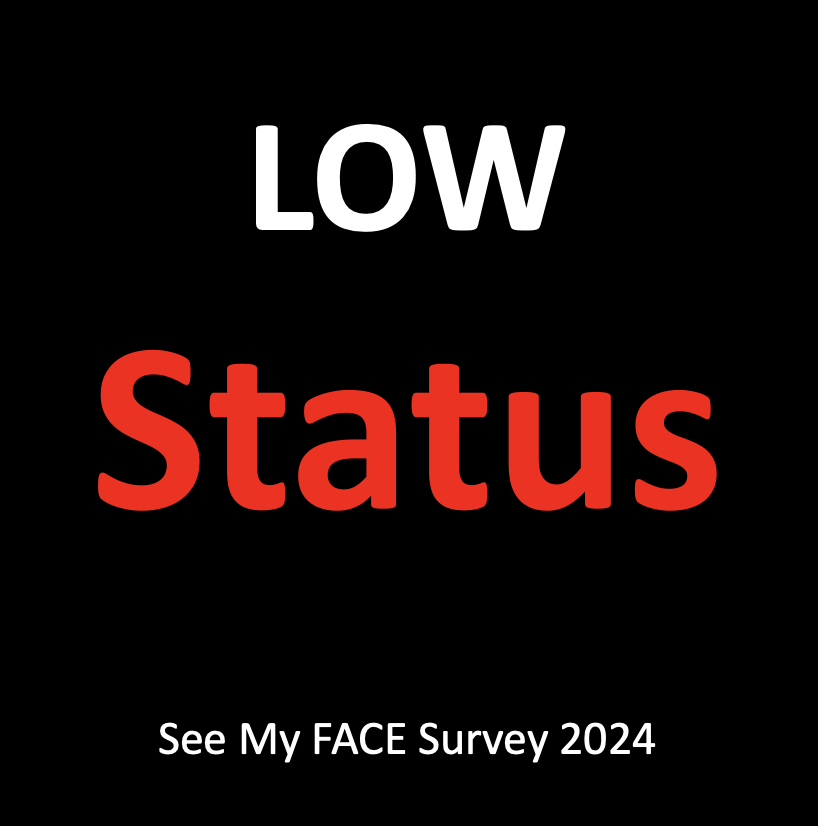Low status
This companion page is one of many included in the See My Academic FACE survey findings officially released November 24
Featured first are Black and racially minoritised participant answers. Scroll down to see non minoritised or white participant answers to the same question.
The qualitative question below elicited answers answers across several themes
The second theme is Low status
Please add any further insight into your lived experience as an academic/technician/
member of support staff in relation to ‘Race’. How, for example has ‘Race impacted your sense of feeling supported and valued as an educator?
Theme 2 is Low status
Black and racially minoritised participant answers
Low status
3. A white work colleague had the same training as me from the same notable institutions for both of their undergraduate and postgraduate degrees. We were wanting to leave a 0.5 position at the same university to gain full-time employment at another that was advertising full-time positions. We both succeeded in the job interviews, and were given the full-time posts. They were given the Post-graduate programme to teach and I was offered the undergraduate programme.
4. Most academic staff were white. Anyone of colour was sessional!
8. Questions and interactions were more in-depth for me as an overqualified academic in comparison to white academics
13. At interviews there was always a sense I should be grateful if offered a position. I had been asked about if I had children and once about my ethnicity.
“Most academic staff were white. Anyone of colour was sessional!”
19. People often assume I am a technician. Also have to be very firm when attempts to assign me technician work has happened dispite me being an academic lecturer. Also have to be firm when attempts are made to make me organise, DEI events, especially when the Black Lives Matter movement became popular
27. Academia is often perceived as a white space with white academics. Often the assumption in the studio is that you are not the academic but a technician. I have had to make clear to international students that I was a Senior Lecturer as instructions had been ignored (they thought I was a technician). In the early days of my career, I would have facilities come into the room and go straight to one of my older white students for permission to be in the room, assuming I was one of the students. It’s difficult to see a path upwards when most of that space is occupied by white faces. In fashion education as in the industry, the impact from elitism translate into racism as it is often difficult to have the ‘designer’ CV, when as a Black Creative you don’t get the chance to have those roles. So no matter how relevant you are, the elitism works against Black academics so certain departments remain white spaces. It’s about time they are called out!
“No matter how relevant you are, the elitism works against Black academics so certain departments remain white spaces.”
35. I believe that HE and educational establishments have never been set up to encompass inclusion and this mindset set in. So neither students or academics that do not fit the 'mould/white gaze' are assessed as worthy of attainment within education. Thus long standing positions regarding the exclusion of ethnicity, culture and more exist and will continue, given there is so much to unpick.
39. As a technician, I've at times felt that because of my race students and at times other members of staff do not take my advice and expertise seriously, compared to my white colleagues.
42. In my current role, I have the privilege of observing the hiring process firsthand. It is evident to me that applicants from underrepresented groups, particularly those from Global Majority backgrounds, often demonstrate a lesser sense of appreciation for their achievements compared to their white counterparts. This discrepancy can be attributed, in part, to systemic racism, which has historically limited the career accolades and opportunities available to individuals from Global Majority backgrounds, thus diminishing their desirability as candidates for employment opportunities.
65. In 7 years asked to host my first dept wide lecture as part of a lecture series (streamed also) by the Dept. head (about my own practice, something I had never been asked to speak on in the entirety of my time there). I was never asked to deliver a lecture on my practice to the course I taught on or had my work featured in any lectures. At the same time I was delivering lectures outside of the course widely, curating and doing other work in the sector even speaking at Design Week in Thailand funded by the British Council.
“I was never asked to deliver a lecture on my practice to the course I taught on or had my work featured in any lectures.”
A fractional post appeared and it was broached to me less than a year later in Spring 2021 which would encapsulate my existing role but they wanted me to split the role with wider EDI work for the whole dept. (work I was undertaking in my own sector outside of the institution because I had had little support or traction of any initiatives work I tried to support within the institution). I declined the role for a number of reasons but mostly because my work there was impacting me (stress, anxiety) and I inwardly dreaded interactions in person and in correspondence with my immediate boss, the director of the course I was an AL on.
I had had very little support in trying to rectify my challenges despite having to engage the head of the dept. Basically being told that they know he is difficult but not wanting or seemingly able to do anything about it. I was encouraged to modify how I interacted with them and to try to effect the changes myself within the course team, as one of the academic team with the least agency of the group. I know the new fraction role was forced upon my boss, as from the way he notified me about it, it was very clear he was doing it under duress. So despite it being an opportunity hard won, it was not worth my peace to take it on. I declined applying for the role and said I would still be available for hourly paid support and immediately was called in less for the rest of the term and subsequently after the end of that academic year received no hours from the course I was working on at all and none going forward and only 8 hours in the following academic year from another course in the dept that was run by a colleague.
Eventually I timed out as an AL from the institution and received a P60 notifying me of the end of the engagement in Dec 2023. I had some communication with the Dept head at times but no firm commitment to engage me in any work despite implying an interest in that. It was a very sad and upsetting time for me and I have actively been trying to move on. The same institution that I had this experience with has me listed as notable alumni on their website. As I mentioned earlier most of this survey is in regards to my longest academic engagement and not to other shorter term project based engagement. Also as mentioned I have recently started as a visiting tutor with a new institution. I have had a more positive experience so far. One observation to note in this new institution (and I also enquired about this from a staff member that has been there longer) - the only other people of black decent on staff are part of janitorial team.
“The fact that academics treat technical staff so badly is a massive issue!”
84. The discrimination and equality that falls between academic and technical teaching bodies! Is very visible and the cracks are getting wider. The fact that academics treat technical staff so badly is a massive issue! And the transitions of removing technical teaching for other spontaneous opportunities hinders student learning and building upon a developed and critical approach to practice be it physical or digital. There is no technical representation at my institution, we are more than just what academics treat us as.
Non minoritised or white participant answers
128. My personal experience had not been affected, however there is a big problem here within the Technical Staff. There are members of staff on short term, temporary ‘Arts Temps’ contracts that have been continuously renewed for 5+ years, yet these
129. Staff are told there are not enough hours for a full time position, and when they apply for permanent positions they don’t get them. These staff are contracted every week for the same hours and already doing the job. There is no support in place to help progression into the stability of a permanent role. This affects minoritised staff more so than any other demographic.

